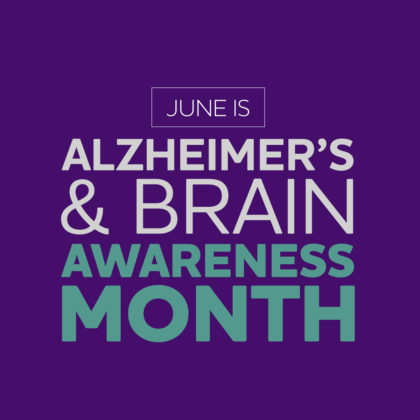This June, during Alzheimer’s & Brain Awareness Month, the Alzheimer’s Association is revealing insights from people living with early-stage dementia and what they wish others knew about living with Alzheimer’s and other dementia.
Many Americans struggle with what to say and do when a family member, friend, co-worker or neighbor is diagnosed with Alzheimer’s disease or another dementia. The shock of someone revealing a dementia diagnosis can leave many at a loss for how to engage. Efforts to be supportive can be dampened by concerns of saying or doing the wrong thing. Worse, not knowing what to say or do, some individuals distance themselves from diagnosed individuals, further deepening the sadness, stigma and isolation people living with Alzheimer’s and dementia can experience in the wake of a diagnosis.
The Alzheimer’s Association recently asked those living with early-stage Alzheimer’s and other dementia what they want others to know about living with disease. Here are six things they shared:
- My Alzheimer’s diagnosis does not define me. Although an Alzheimer’s diagnosis is life changing, many living with the disease say their diagnosis does not change who they are. Many diagnosed individuals say they want to continue doing the activities they enjoy for as long as possible and stay engaged with family and friends.
- If you want to know how I am doing, just ask me. The sudden change in how others communicate with someone recently diagnosed with Alzheimer’s or another dementia is a frustrating experience for many living with the disease. Many individuals say it can be upsetting when family and friends only check on the person through a spouse or an adult child. They say avoiding or side-stepping direct communication only makes them feel more isolated and alone.
- Yes, younger people can have dementia. While the vast majority of Americans affected by Alzheimer’s and other dementia are age 65 and older, the disease can affect younger individuals. Those diagnosed with early-onset Alzheimer’s (before age 65) say it is important for others to avoid the common misconception that Alzheimer’s and other dementia only affects older people and to take cognitive concerns seriously at any age.
- Please don’t debate my diagnosis or tell me I don’t look like I have Alzheimer’s. While family members and friends may be well-intended in attempting to dismiss an Alzheimer’s diagnosis, many living with the disease say such responses can be offensive. If someone says they have been diagnosed with dementia, take them at their word.
- Understand sometimes my words and actions are not me, it’s my disease. As Alzheimer’s disease and other dementia progresses, individuals can experience a wide range of disease-related behaviors, including anxiety, aggression and confusion. Diagnosed individuals say it’s important for others to recognize disease-related symptoms, so they are better prepared to support the person and navigate communication and behavioral challenges.
- An Alzheimer’s diagnosis does not mean my life is over. Earlier detection and diagnosis of Alzheimer’s disease and other dementia is enabling diagnosed individuals more time to plan their futures and prioritize doing the things most important to them. Many people living with early-stage Alzheimer’s and dementia say they want to continue living active, fulfilling lives for as long as possible.
The Alzheimer’s Association of South Dakota will offer two, free, virtual presentations available across the state during the month of June.
10 Warning Signs of Alzheimer’s
Tuesday, June 14 | 7:00 p.m. Central/6:00 p.m. Mountain
The free one hour program:
- Explores typical age-related changes.
- Describes common signs of Alzheimer’s and dementia.
- Offers tips for how to approach someone about memory concerns.
- Explains the importance of early detection and benefits of diagnosis.
- Details possible tests and assessments for the diagnostic process.
- Identifies helpful Alzheimer’s Association resources.
- To register call 800.272.3900.
Understanding Alzheimer’s and Dementia
Thursday, June 23 | 7:00 p.m. Central/6:00 p.m. Mountain
The free one-hour Understanding Alzheimer’s and Dementia program:
- Explores the relationship between Alzheimer’s disease and dementia.
- Examines what happens in a brain affected by Alzheimer’s.
- Details the risk factors for and three general stages of the disease.
- Identifies FDA-approved treatments available to treat some symptoms.
- Looks ahead to what’s on the horizon for Alzheimer’s research.
- Offers helpful Alzheimer’s Association resources.
- To register call 800.272.3900.




